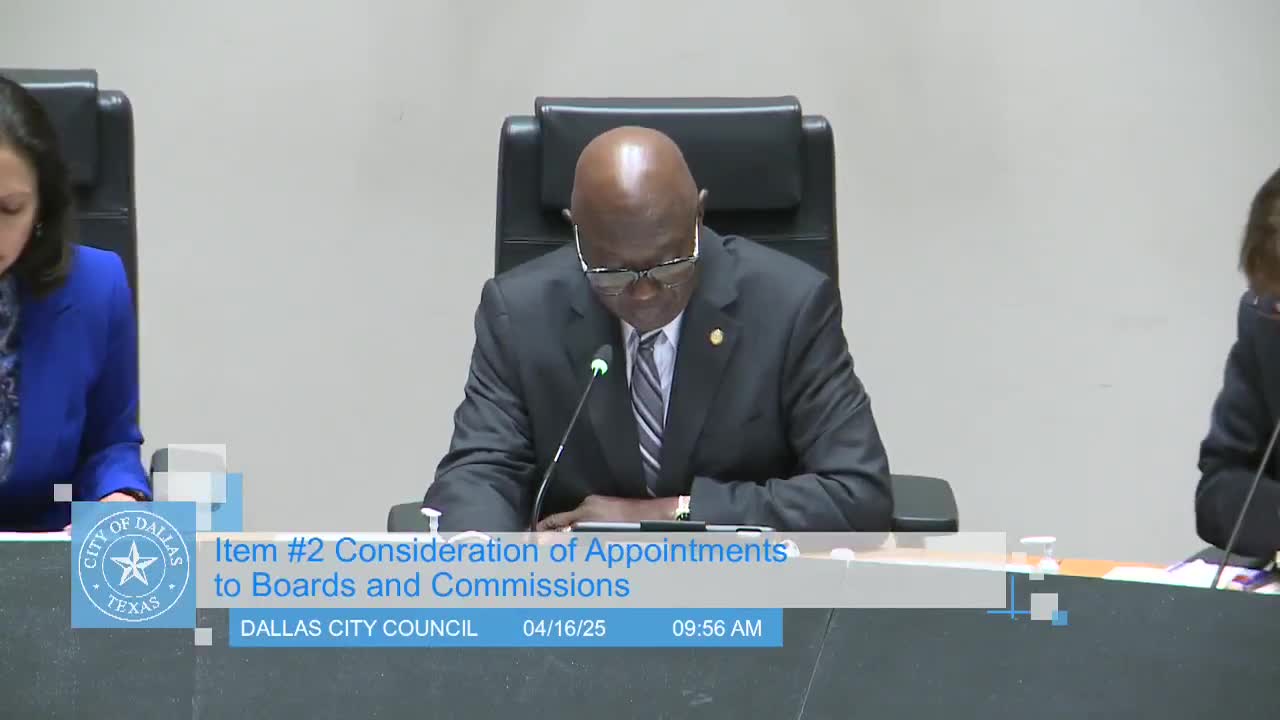Dallas officials preview $29 million-plus HUD consolidated plan budget, set amendment timeline
Get AI-powered insights, summaries, and transcripts
Subscribe
Summary
City staff presented the city manager's proposed FY 2025-26 HUD consolidated plan budget, outlining level funding assumptions, a new neighborhood clearance pilot, and deadlines for council amendments ahead of preliminary adoption and final approval dates.
City staff on April 16 presented the city manager's proposed FY 2025-26 U.S. Department of Housing and Urban Development consolidated plan budget to the Dallas City Council, saying the plan assumes level funding and sets a schedule for council amendments and final adoption.
The presentation, led by Jeanette Wheaton, director of Budget and Management Services, and Shan Williams, assistant director of the Grant Management Division, said the proposed budget currently assumes level funding under the Appropriations and Extensions Act of 2025 (a continuing resolution) and totals "a little over $29,000,000" across HUD's four formula grants: Community Development Block Grant (CDBG), HOME Investment Partnerships Program (HOME), Emergency Solutions Grant (ESG), and Housing Opportunities for Persons With AIDS (HOPWA). City staff told council that HUD has 60 days after the continuing resolution to publish exact allocation amounts and that final numbers are expected by mid-May.
The city manager's schedule asks council members to submit any proposed amendments by April 30. Staff said proposed amendments will be packaged for a return to council on May 7 for discussion and straw votes; a public hearing will be held May 28 and final adoption is scheduled for June 11. Staff also said the FY 2025-26 action plan must be submitted to HUD by August 16 and that grant-funded activities would begin October 1.
Why it matters: HUD formula grants fund affordable housing, homeless services, human and social services, economic development and public infrastructure. Council members pressed staff on program details, administrative costs, and how the city will prioritize prevention and services.
Key details from the presentation and council questions
- Funding assumptions and timing: Because Congress passed a continuing resolution, staff assumed level funding for development of this budget but cautioned allocations could change when HUD issues final figures in mid-May.
- Program totals and categories: Staff presented a side-by-side comparison of current-year actuals and the FY 2025-26 estimates, describing roughly "a little over $29,000,000" in expected HUD funding and noting program income and previous reprogramming were also included in the full funding picture.
- New Neighborhood Clearance and Enhancement Program: The proposed budget includes a new pilot administered by Code Compliance Services focused on clearance, demolition and removal of hazardous structures in target neighborhoods to eliminate hazards and reduce crime. Ariel Garcia, Code Compliance administrator, told council the program's intention is not to target neighborhoods broadly but to finance removal of buildings that already have court-ordered demolition orders; Garcia also agreed staff can create a notification process to inform district council members if multiple demolitions are planned in a small area.
- CDBG caps and public services: Staff reiterated federal caps that limit CDBG public services to 15% of grant plus program income and limit program administration to 20% for CDBG-cap categories. Council members discussed directing CDBG public-services funding toward community violence intervention programs; the city manager said the administration is exploring options and meeting with philanthropic partners to leverage non-city funds.
- HOME program and administrative costs: The HOME grant remains targeted to homebuyer assistance and development. Cynthia Ellickson, director of Housing and Community Development, explained that the HOME program's administrative line covers staff time and manager salaries split between grant and general-fund responsibilities; the proposed HOME program total is approximately $5,500,000 with about $957,000 shown for program administration and staff in the presentation. Ellickson said the city processes applicants whether they ultimately qualify or not, and staff plans to outsource the homebuyer assistance program later this year to improve efficiency.
- ESG and homelessness services: The Emergency Solutions Grant budget shows an increase for emergency shelter and a restructuring of street outreach. Christine Crossley, director of the Office of Homeless Solutions, said ESG-funded emergency shelter is expected to serve about 4,740 people, and rapid rehousing through the bridge program was described as serving about 10 people (staff noted those figures can fluctuate). She said two ESG street outreach positions will be phased out this fall as outreach responsibilities transition to the Office of Emergency Management and Crisis Response.
- HOPWA: Jessica Galsha, director of the Office of Community Care and Empowerment, said HOPWA funding (for persons with AIDS) supports six programmatic components: emergency tenant-based rental assistance, facility-based housing (contracts with operators), housing placement with wraparound supports, housing information and administrative costs. Council members requested a memo listing HOPWA providers, historic service data and how HOPWA dollars are distributed between project-based and tenant-based assistance.
- CHDO set-aside: Staff confirmed HOME rules requiring at least 15% for community housing development organizations (CHDOs) and up to 5% for CHDO operating assistance. Staff said Dallas has few active CHDOs and that the 5% operating set-aside has existed in prior budgets even when it was not expended.
Council direction and follow-ups
Council members asked staff to provide more granular data: the number of people served under HOPWA, lists of HOPWA providers and their targets, more detail on program outcomes and reporting for violence-prevention investments, and specifics on public-infrastructure projects funded by reprogramming. Multiple council members urged staff to consider funding community violence intervention programs, either from CDBG public-services dollars or other city funding, and the city manager expressed support for including such an amendment and for coordinating with philanthropic partners.
Next steps
- Council amendments due to the city manager by April 30. - Council return on May 7 to discuss proposed amendments and construct straw votes. - Public hearing May 28; final adoption scheduled June 11.
Ending note: Staff cautioned final grant allocations from HUD could change the proposed budget; the city will update council if HUD's mid-May allocation differs from the level-funding assumption in the proposal.
